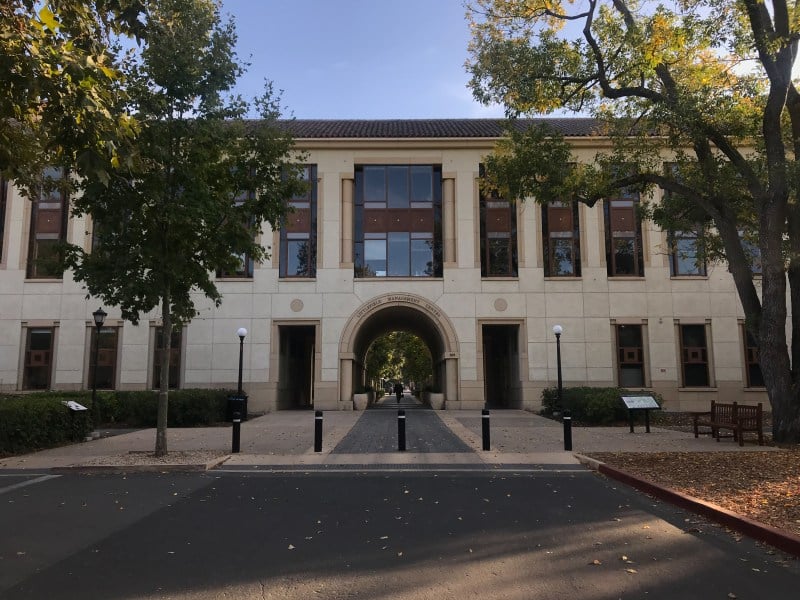Board of Trustees Chair Jeff Raikes ’80 relayed the University’s commitment to affirming international collaboration in research and provided an update on the Board’s review of Fossil Free Stanford’s petition for divestment from large oil and gas corporations, in a Tuesday briefing on the Board’s first meeting of the year.
Research
The Board focused on Stanford’s research ecosystem in its most recent board meeting. Raikes said that University President Marc Tessier-Lavigne underscored two main elements of research in his speech to the trustees: the importance of investing in research, as well as the importance of international exchange to the spreading of ideas.
Raikes emphasized Stanford’s commitment to global collaboration and research opportunities. He added that in an environment where “some people would question or push back on the inclusion of international members of our community,” Stanford highly values and fully supports the international community, especially when it comes to research. Raikes’ comments come on the heels of controversies regarding Stanford’s research ties with Saudi Arabia and Chinese companies including Huawei last year.
Vice Provost and Dean of Research Kam Moler then provided trustees with an overview of the scope of Stanford’s research ecosystem. She emphasized that despite the recent changes in Washington that have constrained the availability of funding, Stanford faculty members remain competitive for funding from external sources.
Looking forward, she hopes that the University establishes larger, more diverse and more flexible research teams to address what Raikes referred to as “the key questions of our time.” Raikes added, “an important part of our long-range vision is providing flexible resources and platforms for all of our scholars and lowering barriers across organizations for collaboration.” Moler further emphasized the importance of weaving data science into the university’s research fabric and honing tools and skills for data-driven research.
Fossil fuel divestment
Raikes then addressed Fossil Free Stanford’s (FFS) petition for full divestment from fossil fuels from last spring. The petition demands that the University immediately freeze investment in big oil and gas companies and commit to complete endowment divestment from direct and indirect holdings in these corporations.
The Board of Trustees’ Special Committee on Investment Responsibility is reviewing FFS’ formal report this fall and will take action under the guiding principles of Stanford Management Company’s Statement on Investment Responsibility under its recently-launched Ethical Investment Framework.
To qualify for divestment, the Statement currently mandates that an investment be “abhorrent and ethically unjustifiable,” citing apartheid, genocide, human trafficking, slavery and violations of child labor laws as examples of such qualifying company actions.
The Committee has set up a task force which “will engage with FFS and with others in the University community to listen and understand the underpinnings of [FFS’] proposal more deeply,” Raikes said.
An Advisory Panel on Investment Responsibility, which no longer exists, recommended against total fossil fuel divestment in 2016.
Sexual violence survey
Raikes also recapped the recently-released results of the campus climate survey on sexual violence, which indicate that undergraduate women and non-cis-gendered students have experienced significantly more nonconsensual sexual contact since coming to Stanford.
“The findings clearly indicate that we and other universities have a long way to go in creating the kind of campus culture that we aspire to have at Stanford,” Raikes said.
To address the issues brought forth in the data, the University is undertaking an external review led by national experts to provide recommendations, according to a campus-wide email sent by Provost Persis Drell. Starting in November, the University will also host a community coordinator from the Young Women’s Christian Association to provide resources for Stanford affiliates impacted by sexual violence and harassment.
Annual report and sustainability
Raikes also discussed Tessier-Lavigne’s annual report to the Board, emphasizing that the Board will continue to support the University’s Long-Range Planning initiative, especially with regard to an upcoming fundraising campaign to finance the effort. Raikes declined to provide further details on the campaign, noting that it is still in its early stages.
Another topic brought up at the meeting was Stanford’s work in environmental sustainability. Dean of the School of Earth Stephan Graham highlighted Stanford’s plans to accelerate its efforts in sustainability, which included new zero-emission energy solutions to limit carbon, new data-driven strategies to help communities adapt to climate change and climate simulation research to help evaluate predicted changes to ecosystems.
Contact Marianne Lu at mlu23 ‘at’ stanford.edu and Claire Wang at clwang32 ‘at’ stanford.edu.
